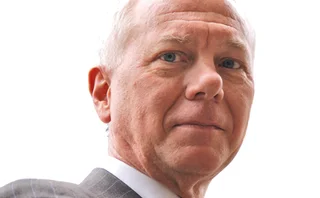
Snow hails CME's China deal
The Chicago Mercantile Exchange (CME) has forged a ground- breaking deal with a central bank-sponsored foreign exchange trading platform in China, in a move hailed by US government officials as a crucial step towards renminbi flexibility, reports RiskNews’ sister publication, FX Week .
"This initiative illustrates the seriousness of China's effort to reform and strengthen its financial system as it moves towards a more flexible exchange rate system and greater integration in the world capital market," said US secretary of the treasury John Snow. "By drawing on the expertise of the private exchanges, China will have access to the best technical expertise available." He referred to the deal as a "milestone" for the country, adding that it was important it moved to a more flexible exchange rate as soon as possible for the benefit of the global system. "China holds a significant and growing place in the international trading system, so it is appropriate that China acquires the financial and economic tools available commensurate with its size and presence in the markets."
The deal places the CME in an ideal position to win market share in the potentially huge Chinese market once financial market liberalisation takes place.
"Relationships are critical throughout Asia, especially in China," said CME chairman Terry Duffy. "We can't predict the timing of China floating its currency, but we believe that with the educational activities and information sharing we will have in place through the agreement, the CME will be in a very good position when the Chinese markets do open up."
Tai Hui, economist at Standard Chartered in Hong Kong, said: "Everyone's looking into the Chinese market. A head start co-operating with the CFETS puts the CME in a very advantageous position."
A key part of the insight CME will offer will be on the necessary infrastructure, risk management and regulatory processes required for creating a successful forex derivatives market, including the central counterparty clearing process that the CME has, said Duffy.
Risks of unexpected movements in exchange rates are inherent in the forex market, said Snow. "This helps China develop the technology 'backbone' and internationally standardised tools – such as futures and forward contracts – allowing companies and individuals to insure against such risks at a nominal cost," he said. "For a large economy like China's, an orderly transition to greater currency flexibility is important for its own domestic economy, for the Asia region, and for global economic growth."
Analysts last week said the CME could prove a useful partner in the modernisation of the Chinese forex markets.
"This kicks off the round of expansion in terms of renminbi hedging products, and is a crucial step in liberalising the exchange rate," said Hui.
But others warned that it is not necessarily a signal that China would relax its regulations any sooner. "China sees this as a normal development and a progression towards its goal of derivatives development that was announced at the beginning of the year," said Bill Xu, economist at Standard Chartered in London. "It's good for China to receive this technical support, but it will not speed things up."
CFETS provides an electronic bidding system for matching spot renminbi against the US dollar, Hong Kong dollar, yen and euro. It enables 400 banks – 200 of which are domestic banks and 200 foreign banks in China – to bid and offer on spot foreign exchange. It is the only forex and interbank money market in China, and also handles clearing for all the trading members in its forex market.
The deal adds to agreements the CME has with other institutions in the region, including the Singapore exchange, the Korea Futures Exchange, Tokyo Stock Exchange and Shanghai Futures Exchange.
Only users who have a paid subscription or are part of a corporate subscription are able to print or copy content.
To access these options, along with all other subscription benefits, please contact info@risk.net or view our subscription options here: http://subscriptions.risk.net/subscribe
You are currently unable to print this content. Please contact info@risk.net to find out more.
You are currently unable to copy this content. Please contact info@risk.net to find out more.
Copyright Infopro Digital Limited. All rights reserved.
As outlined in our terms and conditions, https://www.infopro-digital.com/terms-and-conditions/subscriptions/ (point 2.4), printing is limited to a single copy.
If you would like to purchase additional rights please email info@risk.net
Copyright Infopro Digital Limited. All rights reserved.
You may share this content using our article tools. As outlined in our terms and conditions, https://www.infopro-digital.com/terms-and-conditions/subscriptions/ (clause 2.4), an Authorised User may only make one copy of the materials for their own personal use. You must also comply with the restrictions in clause 2.5.
If you would like to purchase additional rights please email info@risk.net
More on Economics
Webinar – Nowcasting the US economy
Join CME Group Chief Economist, Blu Putnam, as he shares insights using alternative data and nowcasting to monitor developments in the US economy.
Fed Funds Futures in a Post-ZIRP World
As the FOMC returns to more active management of its key target rate, Federal Funds futures have experienced dramatic growth.
Challenging economic pessimism: an optimistic note
A contrarian, upbeat view of the long-term economic outlook
Economists, like hedge fund traders, need open minds
Economists, risk managers and traders must learn the lessons of crisis, says Kaminski
Fed wrong not to start QE tapering, says UBS economist
The surprise decision by the Federal Reserve last month not to scale back its quantitative easing programme will create more volatility, says economist
IMF's Blanchard warns Europe could drag world economy down
IMF chief economist says ‘three-speed’ global economy could be dangerous







